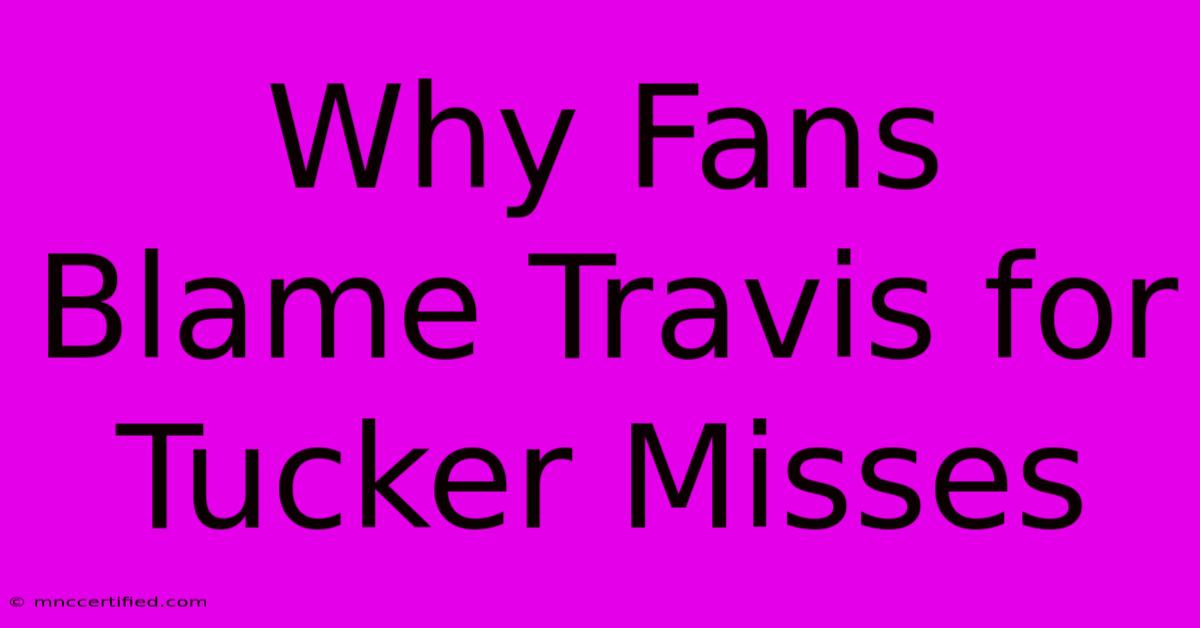Why Fans Blame Travis For Tucker Misses

Table of Contents
Why Fans Blame Travis for Tucker Misses: A Deep Dive into the Frustration
The palpable frustration among fans regarding Tucker Carlson's missed opportunities often manifests as direct blame aimed at his long-time producer, Justin Wells. But why this intense focus on Wells, and is it justified? Let's dissect the complex relationship between Carlson, Wells, and the audience's perception of their on-screen product.
The Producer's Role: More Than Just a Faceless Name
Justin Wells, as Carlson's producer, plays a crucial role far beyond simply managing logistics. He’s deeply involved in shaping the narrative, selecting guests, and influencing the overall tone of the show. This behind-the-scenes power makes him a convenient target for frustrated viewers. When segments fall flat, miss the mark, or fail to capitalize on a trending topic, it's easy to point the finger at the person orchestrating the show's elements.
Key Aspects of Wells' Influence:
-
Guest Selection: The choice of guests significantly impacts the success of any segment. If a guest fails to provide insightful commentary or engages in unproductive debates, viewers might blame Wells for poor guest selection, even if Carlson ultimately decides who appears.
-
Topic Selection and Angle: The direction and focus of a segment heavily relies on the producer's input. If a missed opportunity arises from failing to capitalize on a breaking news story or a relevant cultural event, blame often falls on Wells for a perceived lack of strategic planning.
-
Segment Flow and Pacing: The overall rhythm and pacing of the show are crucial for maintaining viewer engagement. A poorly structured segment, filled with tangents or awkward transitions, can leave viewers feeling unsatisfied, leading to the accusation that the producer didn't properly manage the show's flow.
The Visibility Paradox: Behind-the-Scenes Power, Public Frustration
The irony lies in the fact that Wells, unlike Carlson, remains largely unseen by the audience. This lack of visibility exacerbates the frustration. Viewers can directly criticize Carlson, but the perceived lack of accountability for Wells amplifies their discontent. They see the outcome – a missed opportunity, a poorly executed segment – but lack a clear understanding of the intricate production process and the multiple contributing factors.
The Unseen Hands Shaping the Narrative:
It's essential to remember that television production is a collaborative effort. While Carlson's on-screen presence makes him the most visible face, many individuals contribute to the final product. Wells's role is undeniably significant, but assigning him sole responsibility for every perceived misstep oversimplifies a complex process.
Beyond Blame: Understanding the Nuances
Instead of focusing solely on assigning blame, a more productive approach involves understanding the multifaceted nature of television production. Missed opportunities can result from various factors:
- Unexpected developments: Breaking news and rapidly evolving situations can derail even the most meticulously planned segments.
- Guest unpredictability: Live television inherently involves an element of risk, and even carefully selected guests can deviate from expected lines of questioning.
- Internal constraints: Network policies, time limitations, and internal disagreements can impact the final product.
Conclusion: A Shared Responsibility
While Justin Wells undoubtedly plays a crucial role in shaping the Tucker Carlson show, attributing all missed opportunities solely to him is an oversimplification. It's more constructive to recognize the collaborative nature of television production and the numerous factors contributing to both successes and setbacks. Understanding these intricacies helps viewers approach criticism with more nuance and avoid misplaced blame. Ultimately, the success or failure of any television segment is a shared responsibility among the entire production team.

Thank you for visiting our website wich cover about Why Fans Blame Travis For Tucker Misses. We hope the information provided has been useful to you. Feel free to contact us if you have any questions or need further assistance. See you next time and dont miss to bookmark.
Featured Posts
-
Roy Keane Daughters Question Reaction
Nov 18, 2024
-
2024 Mr Vegas Darts Finals Day
Nov 18, 2024
-
Vikings Vs Titans Live Score Updates
Nov 18, 2024
-
Jon Joness Aspinall Fight High Ufc Price Tag
Nov 18, 2024
-
Staffords 4 Tds Power Rams Win
Nov 18, 2024